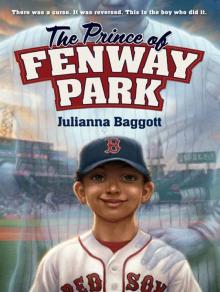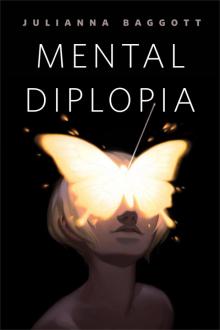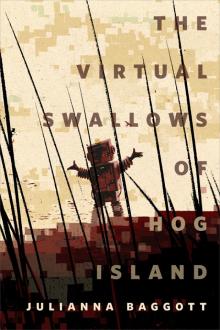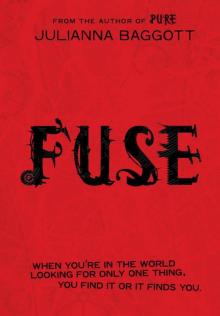- Home
- Julianna Baggott
The Madam Page 14
The Madam Read online
Page 14
“Nope, you don’t.” Delphine doesn’t want to hear that she can change her life, that she and Roxy can pack up and go somewhere else and start all over again. Or she could even clean up right here, just stop taking in men, stop smoking. See if they can work out a deal with Alma. Delphine anticipates the high. She can already taste a sweetness, feel the tightening of her lungs and a certain warmth spreading out from her chest. Delphine rolls the opium, now cooked, in the bowl until it becomes a small pill. “It’s a loud world, too bright, too colorful. Don’t you think? Sometimes these men come in, and I wash them down. I squeeze their tips to see if anything comes out, if they’re sick, and their meat is so pink and thick a thing, with its blue veins, ticking away from their hearts above. It’s too much. They’re too alive, if you know what I’m saying. We’re all just too goddamn alive.”
“I don’t like to hear about it,” Roxy says. “You know I understand you. You don’t have to talk about them men’s bodies.”
Delphine looks over at Roxy, her wide eyes, her long face heavy with big bones. “I wasn’t saying it to make you feel bad. You know it’s just the way I am. I say what is there in my mind. I couldn’t do that before with the men I was with. But I can with you, Roxy. It’s like being with another part of myself.” And this is the truth. When they are in bed together, it isn’t like being with a man at all. It’s like doubling herself—more than doubling, because Roxy is so large. When they are wrapped together, Delphine recalls all of the stories of Roxy’s youth—you’d think it was sorrow that made her grow so tall if you’d heard all Delphine has heard—and Delphine feels that by taking Roxy in her arms, she’s making her whole again and, in so doing, saving herself a little, too, because there’s finally something worth saving, goodness, redemption. Isn’t that a kind of love? She’s known too many to count. So far, this is the best. Making love to Roxy is nothing like having sex with men, which always seems, even in its best moments to be more about struggle. She walked in on one of the girls with a man, just a few weeks back, and she had to stop herself from calling out. She can no longer recognize the difference between passion and a fight. Delphine knows that she hurts Roxy, but whenever she begins to feel guilt, it’s always consumed by anger. Delphine can hear herself thinking, Roxy signed on to this wreck. She knows what I am: a whore, a fiend. She can’t be angry about it now. She says, “I’d prefer to be called a piece of calico. I like that expression, but I’m a clapped-out hole. That’s the truth of it. And I’m having a good day.” There’s a catch in Delphine’s voice. She despises it. Her father always talked about Jezebel, thrown from her window for being whorish, her body trampled by horse hooves, torn up by wild dogs till there was nothing to bury. But Delphine imagines that she would have buried what she found if she’d come across Jezebel, even if it were the body parts of a stranger—the dead are all strangers. A hand pressed to dirt, a fine rib, an arch, an ankle, a tilted pelvis tipping light like milk. Delphine clears her throat. Begins again. “I’m having a good day. And you know they’re rare. Let me enjoy it.”
She forces the pill into the hole in the bowl’s center. As it heats, she remembers how her mother made her walk home, her dress and coat frozen over, her stockings stiff. Her mother cuffed her on the head once. Cuffed her good in front of her father and sent her to the tub. And Delphine sunk down its rounded sides, let her knees, red and bony as doorknobs, rise out of the water. She held her breath and imagined an imbricate skin of ice, the catfish cruising the river bottom, their whiskers as thick as piano wire, and how it would be to die, let the water take you in, as the ice above her head healed over.
She sticks the needle through the hole, withdraws it, then tilts the pipe until the pill hits the flame. She puts her mouth to the pipe’s long tip, draws the fumes into her throat, her lungs, holds onto it until there’s a giving in, like the first small gestures one makes before getting undressed, the world relaxes, steps out of its slip. It’s like this. She steps out of her slip. Roxy puts her head in Delphine’s lap. Delphine drinks the smoke, gulp after gulp, thickly down like honey. She looks out the window and sees herself reflected and beyond that, a girl in a dress walking quickly across the yard. A boy appears, stands out from the bushes. The girl is wearing a white dress—or is it a nightgown—and Delphine wonders if it is her own soul she sees, drifting out across the yard.
2
Lucy wakes Irving up with a few sharp nudges of her bony fingers on the beef of his bare shoulder. She is a small woman with a narrow waist and tiny hands. Her hair, so dark and shiny it looks greased, is cropped, sharply meeting her jawline. She’s wearing a white dress, see-through in its gauziness. With the sun from the window at her back, Irving can make out the dark outline of her body, each thin leg. He puts his hand over his eyes and lies back on the bed. He’s angry about the sun. He hates the way she wakes up and opens all of the shutters until the room glows dizzy with light. And then she’ll complain about the thick heat, ask him to take her to Cheva’s to cool off under their slow fans. She has no sense. Cheva’s is still dank and hot, humid with bodies, and stuffy, as if the yeasty beer were constantly rising like bread dough all around them.
It’s no wonder he’d been dreaming of heat, the shiny backs of elephants. His mother rarely talked about the trip to Miami. Once, however, he remembers she mentioned an elephant on the docks. He’d heard of circus elephants all the way from Africa where darkies ride them like horses, but he’d never seen one, still hasn’t, and, although it’s childish, he would like to go to Miami and have a giant gray elephant with wide ribs and a short hairy tail, enormous, to greet him. He’d actually thought of telling Lucy that they should steal the laundry truck—not forever, just for the trip—and go to Miami to see the ocean. Not to find his father. Lucy never knew where his father had gone to, never had asked. The trip would be a way to hold on to Lucy, to delight her, because she needed much delighting. And in the beginning he had delighted her just by swooping her up in his arms and cradling her like an oversize baby. (It reminded him sometimes of Willard, his charge, taken away. He misses the babyish bloat of his face, can’t stand to go for visits, to see his brother so walled in and contented. It makes him exhausted by failure.) But Lucy grew sullen and testy, pacing the room, dim when he could persuade her to keep the heat out. He could tell that she was antsy, but he never mentioned Miami. He could never quit his job. He could never steal the truck. He could never disappear on his landlady, Mrs. Trimski, who needed his money each week. He could never tell his mother that on a whim, he took Lucy to Miami. It would be a betrayal, against family rules to even mention Florida.
Lucy wipes her nose, as if she’s been crying, but there are no tears, no puffed eyes, only this little display of drama. She says, “I was going to write you a note, but there’s no use. I’m off.” She picks up her suitcase. It’s actually an old empty accordion case. He’s never seen the accordion. He asked about it once, but she said it was none of his business. “You’d like it if I said I was heading back to make confections and live at my mother’s house where you found me, but I’m not. I’m going to Wheeling, because it’s my nature, to turn my hand to the work you hate. Didn’t you always expect me to? Didn’t you take me in knowing I was on my way somewhere else?” She has one hand on her hip. “This is just like me. Isn’t it? And it serves you right. You can tell your mother that she was right about me, too. She never liked me, and I am not so sure that you ever liked me either. Not really.”
It doesn’t surprise him. He’s learned that even in the middle of summer when he feels like he’s struggling against the sun, not just to block it out but to try to hoard darkness, even now on a blistering day like today when heat seems as tricky as a leak, the way water can begin in one spot then run along the unseen pipes and beams and pool in another, Irving is always anticipating winter. He knows that the heat will slip away, incrementally, and suddenly a cold will arise and the snow will fall white, like moths, and turn gray, then black as it collects soot from the air. He is al
ways steeling himself for loss. She’s right that his mother never liked her, and he decides she’s probably right about his affections for her, too. He never really knows if he loves a girl. He doesn’t know anything about love. It’s a sickness, a malady, something we’re doomed by. He wonders if his father loved his mother. It’s a difficult thought, because sometimes he feels his father never really existed. He has become a myth, tall and glib, a bear-fighter (although the bear was dead), emphatic and exhausted, glossed to a brilliant shine by Irving’s forcible memory. He’ll never really know.
Once, though, he learned something new about his father. He saw Smitty on the street, Sir Lee’s boy, in a thuggish pack loping down Court Street, not too many blocks from Cheva’s Pool Hall. Irving walked right up to him. He said, “Smitty, Smitty. It’s me, Irving.”
The other boys circled around, but Smitty put up his hand. “Yeah, so what is it, boy? What do you want?”
He could tell Irving was after something. Irving asked him if he’d ever been to Florida when Sir Lee went down to get his trunk, the one that made him enough money to buy that car.
Smitty reared back with his pointy jaw, his sharp angles, laughing. “Sir Lee is a son of a bitch. And you all believed him.” He paused. “You still do. He never got a goddamn trunk in Florida. He was running a scam in Biscayne Bay with a guy name of Jake who worked with an old man name of Charlie, who’d gotten a shipment of junk. Jake bought it up, and Charlie would sell it. And every time Sir Lee got some fool to go down there for a trunk, he got a kickback. We were fat on kickbacks all that summer. If you’d’ve had more money, he’d’ve sold you a swamp.”
Irving was memorizing words—Miami and Biscayne Bay, Charlie and Jake—because he thought that once he was a man with his own money, he was going down to Miami and find his daddy. And tell him what? He didn’t know. And bring him home? He wasn’t sure that was the point of it all, either. Irving has tried not to envision his father, as that kind of imagining is a waste of time, or so his father told him time and again, a warning against sloth and laziness, but sometimes his father’s face is almost clear, and he’s got a white hat, a cigar in his teeth, a bear-fighter now in Miami, ludicrous. Whenever Irving conjures it up, he scoffs at himself for it.
Irving says to Lucy, “Well, now. There you have it.”
She huffs a sigh. “Is that all you’re going to say?”
He stands up. “I guess I’m late for work.” He walks to his closet and fishes his shirt off its hanger. He gets dressed while Lucy glares at him.
“You look like an idiot in that bow tie! You shouldn’t wear it. As if you need a bow tie to take people’s dirty laundry! You’re as skinny as a Western Union messenger pumping his wobbly bike in his choke rag and knickers.” She turns and walks out the door, slamming it behind her. He listens to her feet on the stairs and for the front door to swing open, always hushed by the thick fur rug, and then shut, jingling a leather strap of sleigh bells so the old lady can keep track of who’s coming and who’s going from the kitchen sink where she smokes cigarettes.
He positions himself by the window, hidden by the line of straight hung curtains, edged with fringe by Lucy in a fit of domesticity, and watches her skitter down the street, her white skirt bouncing behind her like a swinging doggie door, her ass this little flurry of action.
Irving adjusts his bow tie, which now embarrasses him. He thinks of the day set in front of him. He’ll pick up and deliver door to door, exchanging clean, folded laundry for dirty and sour. Clothes and linens bunched with sweat, piss, blood. Sheets stained by sex. And he’ll hand the ragged homemakers—red-cheeked from working their gardens, entire yards taken over to produce enough to survive on—their damp wash to be ironed. Windblown and breathless, they’ll say they can’t afford the service. Sometimes they put their hands to their mouths and start to cry. He’ll take what money they hand over, but it’s hard for him. He wasn’t raised to take money from women. He was raised to stay out of their way, to let them take care of themselves. He’s afraid of them.
He walks out of his apartment—it still smells like Lucy, a sweet, choking perfume that she would daub everywhere, even on her shiny hair—down the stairs, and up the sidewalk toward High Street. It’s morning, but already the day is gathering heat. He squints. Cars jog down the street. The streetcar winds its way around a corner. Two women jostle by, pushing prams with their large metal spoked wheels that squeak. They are maternal and happy, their stomachs bulging like sweet lower pouting lips. He wants to imagine Lettie being a mother one day, chatting idly with another mother about prices, rashes. Its possible. Lettie could rise out of the house. She’s a skittish girl, but still good, still whole, a virgin, although he’s known more than a couple of men to ask how much for her. Lettie could become a mother, in some other town maybe, like these women—perfect, sturdy, nearly happy. He wants to lie down with them in a large bed, sexless, content. Is there such a thing? He would like to be a father one day, to raise up a baby proudly, the way he’d been doing with Willard before his mother gave him up.
Irving glances into the prams as they pass. Inside one, there’s a fat baby, nearly too big for it. In fact the baby is pulling up, both chubby hands on one side, so that the pram leans, tipping unevenly on its large springs. He wants to stop the woman and tell her to mind the baby before it falls out, but he thinks of her face turning on him angrily. He glances in the other pram, hoping to see a tight bundle, but instead there is a brown paper—wrapped ham, its bone sticking out of the top, headless. It makes him feel sick. There’s a windy spot at the top of his stomach, an empty fatherlessness. It is repeated each time he is disappointed, even in some small way: a streetcar pulling away as he turns a corner to catch it; expecting a baby and finding instead a ham with an axed bone for a head; Lucy gone.
He wonders why he took her in. Because he’s no better than the men who come to his mother’s house or the loud, gusty men at Cheva’s or his own father? How could he be? It’s all he’s known. Perhaps because at first she reminded him of Delphine. He met Lucy at a party. She’d danced barefoot and stepped on a shard of glass. She was bleeding, needing him, and that brought Delphine back to him, the car’s jerky gears, the field of deer he saw that night by the roadside. But Lucy turned out to be nothing like Delphine. Lucy is wide-eyed but conniving. She loved to have sex. Sometimes she’d wake him up in the middle of the night, her warm mouth on his dick. She was like that, and then she could fly into a rage because he called her mother a flour girl—which she was, working for Kincaid in one of those puffed white hats—and she would yank a lamp out of the wall, smash it, and fall limp on the bed in tears. He never knew why, and so it was in a way comfortable, because he was afraid of her and yet a little lovesick, and this is how he’s always felt about women. Roxy, of course, could snap his neck, but also Delphine and the other whores, even his mother, they all make him nervous. They are ravenous, bitter, and then inexplicably affectionate. The girls will curse you for being too clomping and then kiss your cheeks and lavish you, wriggling on your lap, rapacious and needy. Now, Lucy is headed toward Wheeling, by train, perhaps, to become a whore. He thinks, Thirst has no season. It’s a Coca-Cola advertisement pasted on drugstore walls all over town, but it seems to him dark and monstrous. It often pops into his mind.
Irving walks down a side alley to the back of M and H Delivery. He’d like a pack of Chesterfields, passes a glass storefront with a giant advertisement, working girls with cropped hair … CHESTERFIELDS—MILDER, BETTER TASTE. ABSOLUTELY PURE. SMOKE AS MANY AS YOU LIKE. He hasn’t gotten paid, lacks the fifteen cents. He feels the warm press of sun on his back. Sweat trickles down his legs. His pants are already damp, his shorts inching uncomfortably. No, he decides, the damage has been done. He’ll never fall in love, or, if he does, he won’t know it the way a man should, and Lettie will never be a normal woman pushing a pram down the street. They will never shake their childhoods—and not just their missing father, but also their mother with her ugly decisi
ons. His mother will talk about poverty, skinning rabbits and collecting train coal, but, truth, she could have gotten by renting rooms to normal people and working in the mill. She could have refused the nuns’ courtesy and brought Willard home, but she didn’t. There was something in her that made her arch away from a decent, quiet life. Irving will never understand it, because that’s all he wants.
Sammy stands in the dirt parking area. He owns two delivery trucks, stands feet wide, hands on his hips. He’s bulbous, with a red nose pitted like a strawberry and scarred cheeks, always slightly grudging and flustered. He’s talking to Art, who’s already in a truck. Irving recognizes Art’s tanned, sinewy arm, hanging out of the window; his other arm, pale, is out of sight.
Sammy yells out, “Irving, right there. It’s full. You owe me a morning’s loading.” He points to a truck. “I left money on the seat. It needs gas. Go south first and then tank up, loop back. Your check’s there, too, on the seat.” He gives a wave to Art, then disappears into the back door, where he’ll jaw at the workers, women in aprons pinned to their shirts and cinched at their bulky waists—none of them narrow like Lucy’s.
Art glances over his shoulder to Irving. Art is old and struggles under the weight of each sack. He has a permanent expression that is most of all forlorn. At this very moment, Irving is certain that Art once loved a woman who left him to become a whore, and that Irving could become Art once his old bones washed away to near nothing like a bar of soap. Irving could simply wake up one morning, with his driver’s-side arm tan and his other pale, looking saggy-eyed and washed out. He doesn’t know much of anything about Art, whether or not he has a wife and children, if he lives in town, or out in Star City. The only thing Art has ever talked about is playing for the Star City baseball team, some glorious moment in a tedious life. And yet Art is always here with his tired salute, and it suddenly seems heroic to Irving. Art’s ability to show up every day, year after year, to deliver laundry.

 Burn
Burn The Prince of Fenway Park
The Prince of Fenway Park Girl Talk
Girl Talk Mental Diplopia
Mental Diplopia Pure
Pure Harriet Wolf's Seventh Book of Wonders
Harriet Wolf's Seventh Book of Wonders The Virtual Swallows of Hog Island
The Virtual Swallows of Hog Island Fuse
Fuse The Miss America Family
The Miss America Family Burn (The Pure Trilogy)
Burn (The Pure Trilogy)